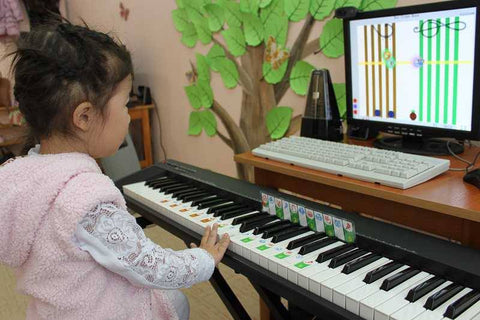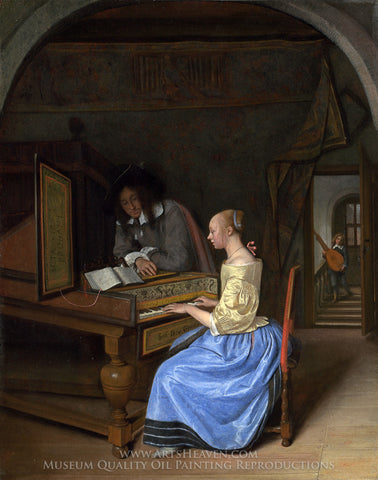Did 'real' piano made the Bach - Bach? Should we start with acoustic?
Children are born able to feel music. Between their desire and their ability to play are our beliefs, holding them back.
Our biggest musical prejudice is that children should be taught to feel music through floor games or lectures. The fact is that a child perceives sounds during the second month after conception! We should take advantage of their instinct and teach children through direct interaction with music notation and piano keys because a piano is the best way to express the full language of music.
In this video babies stop crying and start dancing, when they hear rhythmical music. Why do we keep teaching them dancing with music for years to come?
Do our children really need a coach for phrasing and dynamics before they can coordinate their hands and fingers? We put the cart before the horse when we lecture our students and tell them they don't have a feeling for the music. They were born with one! Candid videos on YouTube capture really young children responding to music before they can even talk. As teachers we sometimes smother our students with too much mothering. But mothering too much in music is redundant--the classical composers didn't do that. They taught hand and finger coordination and the dynamics came naturally, much later.
Instead, we suggest that to play 61-key inexpensive keyboard is going to damage ears and overall development of young people forever! In addition they have to play with dynamics their first pieces before they even learn how to read music fluently.

In fact, not Handel or Bach or Rameau or Couperin or Scarlatti even knew what an acoustic piano with weighted keys is.
On the contrary we teach children nothing between 2 and 5 (or even 6 or 7)
In my book, You CAN Be a Musician, I have already written that the formation of skills is directly connected with the formation of specific neuronal paths in the human brain cortex. To understand this, imagine your own computer. If you have downloaded photo-shop on it, it will work very well with photos. Does that mean you will be able to edit videos with the help of this program? You're joking?–you respond.
Why, then, do many think, that by messing with papers or dancing with singing songs, a child can learn how to interact with music?
Clapping hands, making spontaneous movement when listening to music, singing songs, all form neuronal paths for clapping hands, spontaneous movement and singing songs. These are all activities connected with music. Few people have ever thought though, that they are redundant.
Progress of 3-year-old Sophiyka (Belarus)
I will try to explain why:
This is all that is being done, in the majority of general educational schools in the world: they teach singing songs, clapping hands, playing on 'noisy' instruments and occupying children's time with 'theoretical games/playing.'
What do we have in the end? Hordes of children, who have not learned how to interact with the greatest source of energy, creativeness, a gift from above – music. Not having acquired the skills to interact directly with the keys and notes, this flowing stream always remain beyond their reach. Any person, who stays outside this spring of information is damaged, you could say he is a slave, because he is dependent on the will of a mediator, a guide, who 'knows better,' what needs to be listened to or to be done.
What does this slave feed on? Crumbs from 'the rich man's table–those who directly interact with the current and afterwards impose their vision of things on the slave. In this regard, I do not see much difference here between great musicologists and 'terrible' rappers. Both groups rule over the souls of our children, taking advantage of their passiveness. In this context, the great musicological geniuses are even more despicable: they have access to the energy and know how important interaction with it is. But their pride and their desire to establish themselves, even at the expense of others, are greater than any moral principles.
There exists a notion that, that everything we perceive from hearing, is 'hot,' information. What we can read is 'cold.' Why is this so? Because what a person has heard, cannot, at some future time be analyzed coldly and weighed up by him. He must accept the information in good faith. Therefore, when entering into any serious relationship or transaction, people read contracts and sign them.
By not giving children the opportunity to interact directly with the music, we are denying them the right to decide, what they like. We are forcing them to agree to the conditions of a slave, because we are not giving them the opportunity to analyze, and then with a clear head, understand which music is flowing into their ears and filling their time! They have to depend on a third party who decides for them, what they should and shouldn't love and how to feel the music that they already feel. We, who know everything about GMO and chemicals in food, calmly watch, when our children trustingly absorb everything, that a third party inculcates in them. Sometimes it's such junk, that in comparison with which any GMO–it is a soup made from dandelions.
It is thought, that if a child is told about the great music of professional musicians and this is expressed in a beautiful way–then that's ok. This is also a dangerous delusion. A person needs to develop his own taste. Of course, one may advise a child not to eat rubbish, but all the same, the first obligation is to let him eat himself, and not to put food in his mouth that has already been chewed. Even if the food has been chewed by a genius' stories about music! Can you see the difference?

3-year-old girl interacts with music score and notation (Russia, Far East)
This is how it happens: someone stands on a stage and tells wonderful stories about geniuses. Later people write letters: 'Dear Lecturer, After my child met you, he was very taken with classical music! However it only lasted just a day? What should I do now?'
The world has not come up with a better way to raise independent, strong, educated, self confident, creative people. This way is called literacy and being in the possession of information. Knowledge, ability and applicable skills–these are the three pillars on which the freedom of a child is nurtured. From birth they give him energy and support him, through his life, till the end.
This energy has an important quality: it can be either creative and original (a positive quality) or destructive or self-destructive (a negative quality).
When used during music lessons, we develop in children passive submission to those who directly interact with the music and deprive him/her of his/her own initiative. Denying him of this, we contribute to the atrophy of the creative energy flowing in him. This violation results in the child developing into a person, overflowing with negative energy, that is looking for an outlet. The result could be either aggression directed at themselves or others.
The flow of energy can become positive and constructive only it comes from within the person themselves. For this to happen, it needs support, the caliber inside the individual themselves, never bolstering from other people. Direct communication with music gives this backing. DIRECT communication–this is the most important condition.
What is Active Interaction With Music?
Before the designing of the computer version of my method, I was also heavily into the creation of paper materials and games about music. Especially when a group had to be taught, and there was only one instrument for everybody. Later, with the development of my method, I went to the other extreme: after the appearance of the software, I got carried away with lessons exclusively using the software. And then I began to look for a happy medium. I was searching for the best possible material so that each child could develop successfully and actively enjoy active interacting with music.
What is active interaction with music? This is when the child interacts with musical sounds or musical notes, one on one and he likes it. The paradox of my method is that, the third person–the teacher, mother or mediator–sooner or later(the sooner the better) becomes superfluous. After all, if a child is absorbed in reading a book, for example, his mother does not interrupt his reading every minute to explain why Pippi Longstocking lifted her horse up and why she wears clogs that are far too big for her.
Communication with music is also a very intimate and delicate process.
The children need their own space, so that they THEMSELVES can extract, hear and feel the sounds and decide on their own how to relate to them. I hope it is clear!
And here, it is very important not to over do it with 'the noise around the music.' That noise could be anything: a voice 'behind the scenes,' related musical entertainment and games, attempts to replace the natural process of development of skills with colored/bright distractions.
Let's have a closer look at this:
A voice behind the scenes. After teaching hundreds of children using my method and observing thousands of teacher working with my program, I have noticed that the less we talk to them and show them, the more freedom we give them to understand by themselves what is what and they start enjoying the music. That manner that we have unconsciously carried over from 'traditional' lessons, is still hanging in the air. Oh, how many times have I caught myself grabbing the pointer, to indicate out the note on the computer screen, sang along with a child or attempted to 'put the cart before the horse,' forcing on them, 'correct fingering.'
It takes time to gain experience. I am now convinced, that when the child sees the notes and the fingers, they will find the notes THEMSELVES, if you give them time and the opportunity to interact with the music, one on one.
Here are some examples:
Video of Lubov Yanpolsky. This girl was also one of my students. She was taught and spent a lot of time in our forum. Please note: at the beginning of the clip she said that she didn't want to use the fingering her mother suggested. Her mother's reaction: That’s fine! Lubov's children achieved success and became wonderful performers, who we are proud of.
'Music begins where words are powerless to express.' I don't remember who said that, but I have always subconsciously felt it. To create a process in which the child communicates with music without words from others. This was the goal that I pursued for decades, while working on the development of my method. It turns out that it was worth it! The results confirm that!

